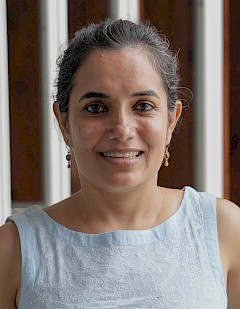Social Sciences

Khusdeep Kaur Malhotra
Assistant Professor
PhD (Temple University)
+91.79.61911266
Research Interests: Precarity and Belonging, Geographies of Political Violence, Spatiality of Religion, Production of Geographic Knowledge
Profile
Professor Kaur is a human geographer who studies place-based precarity and belonging among micro minority communities living in fraught contexts. Her dissertation, which she is currently working on converting into a book manuscript, examines the everyday spatial practices that allow Kashmiri Sikhs to navigate precarity and sometimes even employ precarity to secure belonging rather than sever it. Professor Kaur is also interested in understanding the production of geographic knowledge in India through encounters between citizens and the State, and the changing notions of citizenship that these encounters produce. To this end, she is working on a project examining the digitisation of land records through oral cartographic knowledge transmissions in the Patwaris’ offices in Kashmir.
Methodologically, Professor Kaur is trained in Geographic Information Systems (GIS) using open-source software such as QGIS and proprietary software such as ArcGIS. She hopes to employ QGIS to develop participatory methodologies that contribute to grounded visualisation, marrying her skills in qualitative analysis and mapping. Currently, she is also learning satellite data analysis to understand land use change and web mapping in the programming language R.
Publications
Peer-reviewed
- Malhotra, K. (2024). “Our Roots are Secured Now”: Kashmiri Sikhs and the Jammu and Kashmir Reorganisation Act. In M. Baig and S. Mathur (eds.), Life, Politics, and Resistance in Kashmir after 2019: A Multidisciplinary Understanding of the Conflict. Rowman & Littlefield. https://rowman.com/ISBN/9781793655271/Life-Politics-and-Resistance-in-Kashmir-after-2019-A-Multidisciplinary-Understanding-of-the-Conflict
- Malhotra, K. (2022). Kashmiri Sikh Women and Their Experiences with Militarization. In M. Bhan, H. Duchinski, and D. Mishri (eds.), Routledge Handbook for Critical Kashmir Studies (1st ed.). London: Routledge. https://doi-org.libproxy.temple.edu/10.4324/9780429330810
- Malhotra, K. (2021). The Practitioner’s Bookshelf: Review of Mallika Kaur’s Faith, Gender, and Activism in the Punjab Conflict: The Wheat Fields Still Whisper. Journal of Human Rights Practice,13 (2):480-483. https://doi-org.libproxy.temple.edu/10.1093/jhuman/huab046
- Malhotra, K. (2021). Migration: Persisting Inequalities and Spatial Disadvantage. In S. Chakravorty and N. Sircar (eds.), Colossus: The Anatomy of Delhi (South Asia in the Social Sciences, pp. 147-169). Cambridge: Cambridge University Press.
- Immergluck, L. C.; Leong, T.; Malhotra, K.; Chan Parker, T.; Ali, F.; Jerris, R.C.; and Rust, G.S. (2019). Geographic Surveillance of Community Associated MRSA Infections in Children Using Electronic Health Record Data. BMC Infect Dis., 19:170.
- Baltrus, P.; Malhotra, K.; Rust, G.; Levine, R.; Chaohua, L.; and Gaglioti, A. (2019). Identifying Distinct and Inequitable County-level All-Cause Mortality Rate Trajectories and their Spatial Distribution across the US. Preventing Chronic Disease, 16:180486. DOI: http://dx.doi.org/10.5888/pcd16.180486
- Rust, G.; Zhang, S.; Malhotra, K.; Reese, L.; McRoy, L.; Baltrus, P.; Caplan, L.; and Levine, R. S. (2015). Paths to Health Equity – Local Area Variation in Progress toward Eliminating Breast Cancer Mortality Disparities, 1990-2009. Cancer, 121(16): 2765-74.
- Malhotra, K.; Shim, R.; Baltrus, P.; Heiman, H.; Adekeye, O.; and Rust, G. (2015). Racial/Ethnic Disparities in Mental Health Service Utilization among Youth Participating in Negative Externalizing Behaviors; Eth Disease, 25(2):123-9.
- Malhotra, K.; Baltrus, P.; Zhang, S.; McRoy, L.; Immergluck, L.; and Rust, G. (2014). Local Area Variation in Asthma ED Visits Among 5–14-Year-Old Children Enrolled in Medicaid. J Asthma, 51 (9); 913-921.
Opinion Articles/Analysis
- Malhotra, K. (2020, March 20th) Kashmir’s Chitti Singhpora Struggles between Remembering and Forgetting a 20-year Old Massacre. The Print. https://theprint.in/opinion/kashmirs-chitti-singhpora-struggles-between- rememberingand-forgetting-a-20-yr-old-massacre/384164/
- Malhotra, K. (2020, February 10) Davinder Arrest Threatens the Fragile Trust Kashmiri Sikhs Enjoy with Indian State & Muslims. The Print. https://theprint.in/opinion/davinder-arrest-threatens-the-fragile-trust-kashmiri-sikhs-enjoywith-indian-state-muslims/361026/
- Malhotra, K. (2020, January 23) Shared Trauma Underpins Sikh-Muslim Solidarity in Kashmir. The Wire. https://thewire.in/rights/kashmir-pandits-sikhs-muslims
- Malhotra, K. and Sircar, N. (2019, November 10) SC Ayodhya Verdict Shows Muslims Can Be Given Public Space If It Doesn’t Adulterate Hindu One. The Print. https://theprint.in/opinion/sc-ayodhya-verdict-shows-muslims-can-begiven-public-space-if-it-doesnt-adulterate-hindu-one/318806/
- Malhotra, K. (2019, August 12th) The Case of the Kashmiri Sikhs. The Hindu Business Line. https://www.thehindubusinessline.com/opinion/the-case-of-the-kashmiri-sikhs/article28984332.ece
- Malhotra, K. (2019, March 21) On Kashmiri Sikh Women and Their Experiences with Militarization. Wande Magazine. http://www.wandemag.com/kashmiri-sikh-women-and-their-experiences-with-militarization/
- Malhotra, K. (2019, January 10) Rural Women’s Battle Against Patriarchy and Apathy of the Privileged. Feminism in India. https://feminisminindia.com/2019/01/10/rural-women-fighting-patriarchy-apathy/
- Malhotra, K. (2018, December 2) Healthcare Delivery amid Kashmir’s Political Turmoil. The KashmirWalla. https://thekashmirwalla.com/2018/12/healthcare-delivery-amid-kashmirs-political-turmoil/
- Chowdhury, A. and Malhotra, K. (2018, November 28) Women Voters in Madhya Pradesh Want Jobs, Not Sanitary Napkins and Cooking Gas. The Print. https://theprint.in/opinion/women-voters-in-madhya-pradesh-want-jobsnot-sanitary-napkins-and-cooking-gas/155742/
- Malhotra, K. and Ghosh, S. (2016) Data openness and the Geospatial Information Regulation Bill. Notes from the Field. Ideas for India. https://www.ideasforindia.in/topics/governance/data-openness-and-the-geospatialinformation-regulation-bill.html
- Malhotra, K. and Heiman, H. (2012). Public Health Policy is Political. Am J Public Health, 102 (7).
